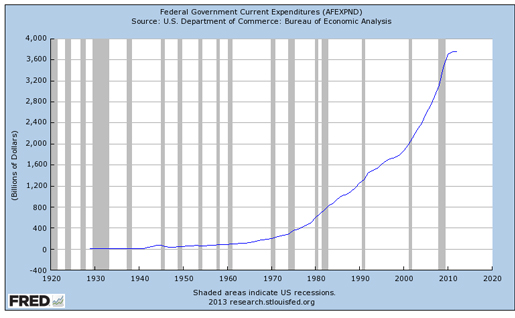Simpson-Bowles: They’re Back!
Yes. Simpson and Bowles are back at it.
Erskine Bowles, former Clinton aide, and Alan Simpson former Republican Senator from Wyoming, are back in the headlines. Motivated by the onrushing sequester crisis – how we all love our crises nowadays – and infused with loads of cash from big business, our dynamic austerity duo snatched the headlines on more time today.
According to their website they have a new, modified, approach to deficit reduction. The urgency is greater, so is the pessimism. They say the need is greater because, well, umm, it is. And their pessimism is greater because, well, partisan bickering is getting in the way of deficit reduction.
If you’re like me and think that the deficit is just fine right now and needs attention only when we have a healthy economy so it can withstand the shock of cutting government spending, then there is no present urgency. Other, of course, to avoid any cuts. I suppose that puts me and the dynamic duo on the same side on that score. We both want to avoid the sequester cuts – they are just awful for the economy.
The problem is that any cuts in government spending will be awful for the economy. No matter when they occur. So I suggest that we go about that cutting, if at all, when we have growth robust enough to sustain a few hits.
Simpson-Bowles see things differently.
They say we need those cuts in order to get to robust growth. They don’t articulate why this is so. They have no theory to back up their thinking.
Well, that’s not true. they do. Let’s give them their due.
They subscribe to the view that we will get the economy going by reducing the deficit. This, their website tells us, will encourage private investment and mitigate the risk of a fiscal crisis. Here’s the relevant paragraph:
Promote, Don’t Disrupt, Economic Growth. The United States must pursue a growth agenda. As the economy recovers, one of the best ways to promote economic growth is to bring our debt under control, which will both encourage private investment and mitigate the risk of a fiscal crisis. However, sharp austerity could have the opposite effect by tempering the still fragile economic recovery. In order to protect the recovery, the sequester should be avoided and deficit reduction should be phased in gradually. At the same time, tax and spending reforms should be designed to strengthen current economic conditions, promote work, encourage innovation, improve productivity, and bolster investment in our future.
First let’s acknowledge that they admit ‘sharp austerity’ would not help matters at all. Good for them.
It’s their basic premiss that sucks.
How will less government spending encourage private investment? This, presumably, is a variant of the old idea that government borrowing sucks money out of the economy thereby less for business. There is no evidence to support this. There is, however, a lot of hot air. The credit markets seem quite capable of providing enough money to finance both government and the private sector. If that were not true we ought to be seeing some form of rate increase because limited supply favors creditors. This isn’t happening. Plus monetary policy has been lax to put it mildly driving down rates and making borrowing very cheap. The consequence has been that investment has been muddling along at a decent if not spectacular rate since the recovery began. Besides big business is sitting on an almost unprecedented hoard of cash. If it wanted to invest it could even without borrowing. And bank balance sheets are not so constrained that they cannot lend. Indeed the most frequent complaint I hear from the banks is that they have too few credit worthy opportunities.
Why is that?
Because business, and especially small business, has a very unsure revenue outlook. Yes, things a getting better, but not that much better.
We have too little demand. More demand means more revenues. More revenues means stringer balance sheets. Stronger balance sheets means better credit. And that means more lending.
All roads lead back to getting demand to rise.
I think Simpson-Bowles must agree: that’s why they argue, as I do, that austerity now is a bad thing. It would depress demand even more.
Their second point in support of austerity is the ‘fiscal crisis avoidance’ idea.
This is also nonsense. Again: where’s their evidence?
Were we on the brink of a fiscal crisis interest rates would be moving up as creditors become ever more wary of lending. This is just not happening. The claim of imminent rate increases has been a steady mantra of the austerity folks since 2009. You would think that after four straight years of being wrong they would re-think their ideas. But no. They simply repeat them more loudly. This is absurd. Not to learn form an error is the worst kind of mistake an analyst can make. It is to put ideology before thought. Simpson-Bowles have fallen into such a trap.
Then there’s the small matter of the fiscal crisis that caused the melt down. It wasn’t a government debt crisis. It was a private sector debt crisis. Over indebtedness on the part of business and households led to an over-reaction once asset values were exposed as fictitious. The subsequent furious saving has depleted demand so much that it has become self-fulfilling drag on growth. It is abating now, but has a long way to go before it is played out. And as long as the private sector is saving and reducing its indebtedness, the government needs to supply demand.
Once more I need to acknowledge that they are clear: any austerity now is a bad thing.
So why is ever a good thing?
Well. Umm. It just is.
At its heart the Simpson-Bowles argument is the usual supply side one. Bolster the supply side and good things will happen. How? It’s magic.
This is not an economic theory. It’s a political position. They are at pains to tell us that immediate and heavy handed austerity is a very bad thing, but then are very vague as to why it should ever be a good thing. Instead they resort to obscure and hopeful statements rather than solid analytical reasoning.
The only explanation I have for their continued argument is that they just like the idea of spending cuts. No reason. Just cuts for the sake of cuts. They wrap this all up in little homilies, big warnings, and subtle suggestions, but they give no reasons. They say they want to protect the disadvantaged and then urge entitlement cuts. They want to burn the village to save the village. They want to encourage productivity growth but are silent on how to divide the fruits of that gain. Is it all for capital as it has been in recent decades? In which case demand will flounder some more. Or do they advocate wage increases? Unlikely I would say since Simpson-Bolwes are funded by big business.
There is one thing we can agree on, though.
They are clear that health care costs need to be reined in before they crush the economy. I agree. America’s antiquated health are system is a disgrace. It needs through renovation.
Good luck with that.


